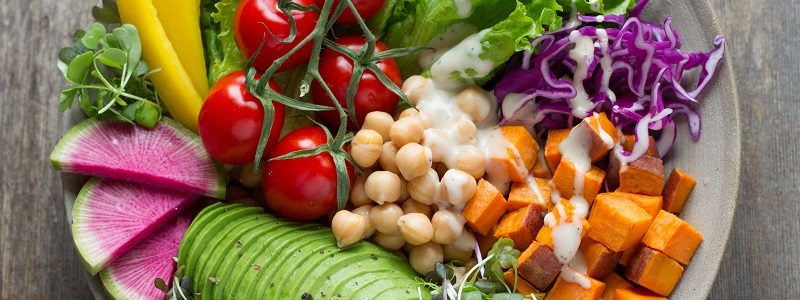Practicing “social-distancing” from the refrigerator.
The “quarantine 15.”
PSA: every few days try your jeans on just to make sure they fit. Pajamas will have you believe all is well in the kingdom.
People have been joking about and lamenting how “shelter in place” is resulting in more eating.
No matter how you have been eating lately, eating appropriately as part of living a healthy lifestyle is something we can all get better at.
This time is calling for us to pay attention to what we eat so that it supports our health. Under extreme conditions, it just may make the difference between life and death.
Really?
Studies have shown that nutrient deficiencies cause impaired immune function. Poor nutrition wreaks havoc on the immune response in children, the elderly and even in people 35 years old and up. Nutrients such as zinc, iron, beta-carotene, Vitamins B6, B12, C, D and E, and folic acid are involved, and we can extrapolate that all nutrients help.
This is an active field of study because we face the challenging health problem of how to keep our immune system healthy.
As we search for answers to modern medicine’s most prevalent and challenging problems, the relationship between nutrition, immunity, and biological function of various natural compounds are preimminent. – J. Trad Complimentary Medicine
One study found that utilizing technology to analyze impact of nutrition on the expression of genes and metabolism reveals that nutrients may influence certain innate and/or acquired immune functions.
In fact, eating at least “5 fruits and vegetables a day,” an achievable dietary goal, is linked with greater immune function in this study.
What to eat, then?
I like Michael Pollan, author of The Omnivore’s Dilemma, and his conclusion to eat real food, mostly plants, not too much.
With all our food choices, what does that really mean?
It is easy to blur the lines when we are out of our comfort zone. We may call corn chips a vegetable and processed food with nuts a healthy snack. Therefore, let’s look at which foods in particular do support our health so that we can choose them now.
Of course, if you cannot tolerate some of these, please do let your individualized needs take precedence.
G-BOMBS
This is a fun acronym developed by Joel Fuhrman, MD. It stands for Greens, Beans, Onions, Mushrooms, Berries, and Seeds. These foods are some of the healthiest for our immune system because of they are chock full of nutrients that are essential for immune function.
Greens
We all have been told over and over again to eat our greens, right?
Some of those nutrients mentioned in the studies for immune function are Vitamin c, vitamin e, folate, calcium, and antioxidants like lutein and zeaxanthin. Green veggies have them. Folate is especially important for producing the immune system workhorses called the antibodies.
Leafy green vegetables can go into a salad, including lettuce, spinach, kale, and arugula. Others such as mustard and collard greens, broccoli, bok choy, and Brussels sprouts can be steamed or roasted.
If you really want to boost your greens intake, you can put them in smoothies or add them to soup and other cooked dishes.
I have even baked with them. I made Frankenmuffins, which do look green because they contain pureed spinach.
Beans
One particular attribute of beans pertinent here is that they contain resistant starch, which feed the beneficial bacteria in our gut. I have talked about that in other blogs. Resistant starch is starch which cannot be used for energy but can be digested by gut flora. Those little critters are so important to our health! Why?
You’ve heard it said that your immune system starts in the gut! Yes, our digestive system is the place where what is outside of us comes inside through the digestive system lining, so the immune system is there to help sort out what should be coming in and what should not. It turns out that beans and legumes in general help feed the critters that act as part of our immune system in the digestive tract.
Beans, peas, lentils and other legumes are great as stews and soups. They are happy to just be themselves, too, as when served as rice and beans.
My secret ingredient in gluten-free brownies that are so moist and rich is blended black beans. By the way, the chocolate has antioxidants, too.
Onions
Onions, like beans, have a kind of fiber which feeds the beneficial bacteria of the gut which act as part of our immune system.
In addition, onions contain organosulfur compounds which are powerful for immunity when we eat them. Other vegetables in this family which have these compounds are shallots, scallions, leeks, garlic, and chives.
I used to watch one roommate years ago begin every dinner by sauteeing garlic and onions, then adding other veggies for a stir fry. Onions can go in just about anything savory, therefore they can be a great food to include any time when you want to support the immune system.
I think of raw chopped onions as a condiment to spice things up, but they also support immune health.
Mushrooms
Particular varieties of mushrooms are sold as supplements because there are plenty of studies showing their beneficial effect on the immune system. However, commonly available mushrooms, a delicious addition to our meals, can do the same thing to a smaller but still beneficial extent.
White mushrooms as well as Portobello and crimini are easy to find in grocery stores. They are known from studies for their immune-modulating and immune-enhancing abilities. They have been shown to enhance a part of the immune system on the front lines called secretory IgA.
I remember being at a vegetarian friend’s house for dinner. She fired up the backyard grill, and I was surprised. What was she going to grill? It wasn’t meat, because she was a vegetarian. On the grill were huge Portobello mushroom caps. As they were oozing juice and roasted and smokey, we slid them on buns and had delicious Portobello burgers with all the fixins’.
I also love to make mushroom soup, grilling the mushrooms until brown then blending them with plant-based milk and seasonings. They also make their way into lots of other cooked dishes, and often find themselves happily in the company of onions and garlic.
Berries
In spring and summer, I delight in the berries coming into season. Other times of year I often rely on frozen berries. They add strong vibrant colors to my meal: red and blue and purple! Mulberries, strawberries, raspberries, blackberries, and blueberries, oh my!
What makes them so good for the immune system? They are high in phytochemicals and vitamins as well as antioxidants. Blueberries contain the antioxidant called pterostilbene, which has been studied for its ability to lower inflammation and thereby prevent or reduce disease.
Mulberries grow freely where I live, and it is my delight to gather them. I often have eaten my fill before I have finished gathering them! I have also picked strawberries in fields. Caught purple- or red- handed when picking them! There is nothing better than connecting with the food I will eat.
Berries are so easy to pop in the mouth raw. They also color and punch up the antioxidant value of smoothies. They are happy to plop themselves down on yogurt, oatmeal or a salad, or wherever you will let them. So, let berries make their way into your meals for their delightful colorful immune-strengthening properties!
I would also include here red and purple vegetables. The color is the giveaway. These vegetables contain antioxidants like the berries mentioned here. Purple cauliflower, purple cabbage, purple carrots, eggplant, red onion, and beets deserve mention here as immune supporting foods. Also these foods contain fiber, which has already been mentioned for immunity effects.
In addition, eating beets can open up our blood vessels in order to improve circulation, which ensures the movement of immune cells to where they are needed. Beets also contain betalains, which can reduce inflammation, which helps reduce disease.
When I was traveling through New Zealand, I was served shredded beets as a condiment at lunch and dinner. What a great way to add a little red veggie to my meal! Red onion is brilliant in salads: green as well as tuna salad. I have made borscht, which is a soup with beets and my recipe includes cabbage.
Seeds and nuts
Here come the foods filled with fiber and the healthy omega-3 fatty acids as well as omega-6 fatty acids. Along with that come nutrients like vitamin e, iron, zinc and calcium.
How is this all delivered in one tiny package? They come into our meals and snacks as seeds such as chia, flax, pumpkin, and hemp, as well as nuts such as walnuts and almonds.
Zinc is a particularly potent immunity nutrient. It has been called a “gatekeeper of immune function.” You can get high amounts of this gatekeeper by eating pumpkin seeds, sesame seeds, and hemp seeds.
I use seeds as a topping to make a crunchy accent to my cooked food and stir-fries. They like to hop on top of salads or just hop into my hand as a snack. They also can be blended into nut and seed butters as well as fermented into a vegan “cheese” for spreading or dipping.
Honorable mention: fermented foods
Traditional yogurt, kefir, saurkraut, and kimchi are fermented foods eaten traditionally around the world. The fermentation process is achieved through bacteria, which remain in the finished product that we eat. These bacteria have been shown to signal the human immune system. This may be a way our ancestors were able to eat slightly spoiled food and not get sick from it, because the immune system was activated for protection.
What will you eat?
The sad news is that 90% of Americans are not eating enough fruits and vegetables a day. A report from the CDC says, on average, Americans are eating fruit once per day and vegetables 1.7 times per day. They recommend 1+1/2 cups of fruit and 2 – 3 cups of vegetables a day.
A multitude of studies, published in peer-reviewed medical journals, make it clear that we need to eat more fruits, vegetables, and other whole plant foods for our health. A lot of disease is based in the poor nutrition of the Standard American Diet, which includes sugar, white flour, and processed foods including processed meat and dairy.
Imagine what could happen in your immunity when you upped the amounts of fruits and vegetables you eat? When you eat G-BOMBS?
Please comment below how much of the G-BOMBS you have been eating. If you dare, write down your commitment to eat more, and how much that is.




